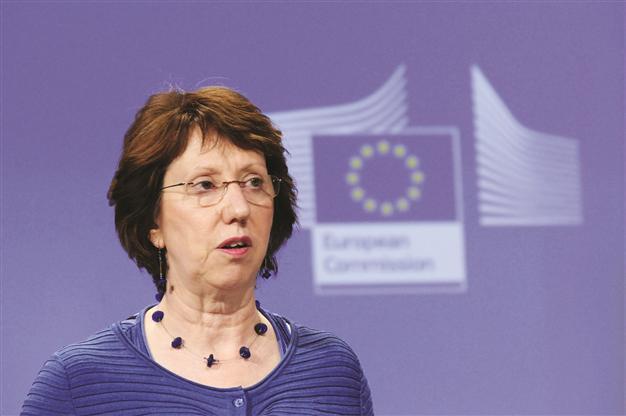Baghdad summit on Iran ends with nuclear failure
BAGHDAD

Catherine Ashton. AFP Photo
Crunch Iranian nuclear talks in Baghdad continued down to the wire, with Tehran threatening to walk away unless world powers ease sanctions in return for a partial suspension of its atomic activities.Iranian negotiators rejected proposals yesterday by six world powers to curb Tehran’s nuclear program, and demanded answers to their own counteroffer meant to alleviate concerns about the Islamic republic’s ability to build atomic weapons.
The nub of the dispute appeared to be Iran’s demand for rapid relief from economic sanctions as part of any deal for it to stop higher-grade uranium enrichment, a pathway to producing nuclear arms, whereas Western powers insisted Tehran must first shut the program down. But there was no sign of either breakdown or breakthrough in the talks that European Union foreign policy chief Catherine Ashton, representing the six powers, and Iranian chief delegate Saeed Jalili extended well into a second day.
‘Istanbul talks were more interesting’
Saeed Jalili, Iran’s top nuclear negotiator, demanded an overhaul of the plan put forward by the world powers after the Baghdad talks began on May 23. An Iranian diplomat involved in the discussions said the package fell far short of a compromise. Iran went into the talks wanting the West to scale back on its sanctions, which have targeted Iran’s critical oil exports and have effectively blackballed the country from international banking networks.
Jalili conveyed his concerns in a private meeting yesterday with European Union foreign policy chief Catherine Ashton, who is formally leading the talks. Ashton’s spokesman, Mike Mann, called the negotiations “tough,” but said that “some progress was made.” At the heart of the issue are two different proposals. The Western package calls on Tehran to halt the production of 20 percent-enriched uranium, which is the highest grade publicly announced by Iran and used for the country’s lone medical research reactor. Western leaders fear the material, far above the 3.5 percent enrichment needed for energy-producing reactors, can be turned into warhead grade in a matter of months. In exchange, the world powers offered benefits, including medical isotopes, some nuclear safety cooperation and spare parts for civilian airliners that are needed in Iran. Iran, in turn, wants the U.S. and Europe to ease harsh economic sanctions on its oil exports in return for pledges to give wider access to U.N. inspectors and other concessions.
Western diplomats ruled out any sanctions reprieve before Iran carried out its part of the deal in a verifiable manner, underlining the mutual mistrust accumulated over the course of a decade-long standoff.
But Iranian media close to Tehran’s delegation said it was insisting on a “principle of reciprocity” in the concessions, which they said was promised by the powers in preparatory talks in Istanbul last month but was not guiding the Baghdad negotiations.
“What we heard in Istanbul was more interesting,” an Iranian delegate said. “We believe the reason [the powers] are not able to reach a result is America. [They] came to Baghdad without a clear mandate so we think the atmosphere is difficult.”
















